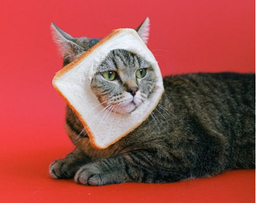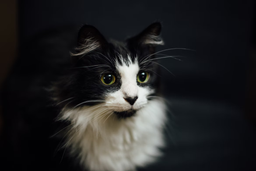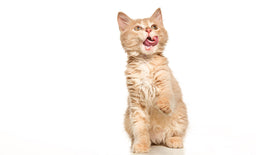Old cat losing weight? Combat natural and illness-induced weight loss with the right diet
As your cat turns ten, you may notice signs of ageing. Cats begin to change and slow down as they reach their senior years. One of the most noticeable signs is a gradual reduction in their weight.
Older cats losing muscle mass is natural and can be reduced with proper nutrition. Whether your cat is used to dry, wet, raw, or homemade food, you can customise a meal plan and tailor it to your senior feline’s nutritional requirements. Sudden or rapid weight loss, though, could point to a more serious condition.
If your old cat is losing weight, Untamed will explain how to slow down the process and spot signs of potential age-related diseases early on.
I used to be in shape. Round is a shape.
Source: Pixabay
Older cat losing weight—is it normal?
Up to the age of about ten or 11, cats’ daily energy needs decrease by about three per cent per year.
In contrast to kittens, who need high calorific content to grow once they switch to solid food, adult cats need fewer and fewer calories as they get older.
The process is so gradual that you may continue feeding the same amounts of the same food, resulting in your kitty slowly expanding. It is the reason behind the middle-age spread many adult and mature cats experience, particularly if they spend a lot of time indoors or have been neutered.
After cats reach ten, their calorific needs begin to increase again.
With increased energy requirements, a senior cat fed on a maintenance diet designed for cats below the age of ten will exhibit:
- Decreased fat
- Muscle loss
- Reduced available energy
As they progress through to 12 and 15 years old, cats lose more lean muscle mass and fat, so they start to look thinner. The exact reasons why are unclear, but keeping your older cat on the same food might play a role.
Why else do older cats lose weight?
Young adult or mature cats need around five grammes of protein per kilogramme of body weight each day, but senior cats need more.
This can be linked to older cats being less efficient at metabolising protein—the functions start to drop significantly after the age of 12, as follows:
|
Nutrient group |
Metabolic efficiency in cats over 12 |
|
Protein |
77% |
|
Fat |
Below 80% |
The numbers imply that senior cats should increase their consumption of protein and fat by up to 25% to maintain the same weight. This is rarely the case as other factors may affect your elderly cat’s appetite.
More serious elderly cat weight loss causes
Older cats are prone to various age-related diseases affecting their appetite, ability to process food, and general organ function.
Of the most common diseases senior cats suffer from, some are more serious than others, but each requires one or more of the following:
- Vet intervention
- Therapeutic care
- A change in diet
Vet intervention
Your vet may need to perform surgical interventions more often than during your feline’s younger years. To avoid stressing your cat with numerous procedures, visit your vet every six months because some conditions can be treated with meds at an early stage.
Therapeutic care
Many older cats need constant medication to keep them healthy.
The therapeutic care may include:
- Vitamin supplements
- Joint care medication
- Insulin to combat diabetes
A change in diet
Responding to a natural shift in metabolism, changing your feline’s diet to better address the signs of ageing is a must.
Your vet can help you determine any specific dietary needs of your cat, but you should try to switch to high-quality food as soon as possible.
The diseases your cat can suffer from in old age as a result of a low-quality diet range from mild degeneration of organs to life-threatening conditions.
Not the vet again...
Source: Pixabay
Degenerative diseases linked to old age
Older cats’ bodily functions lose efficiency over time, and the most vulnerable parts are the:
- Digestive system
- Teeth and gums
- Joints and muscles
- Skin and coat
- Urinary tract
Digestive system
A cat’s gastrointestinal tract becomes more sensitive and less able to process food as cats get older.
Typical problems you may notice are:
- More frequent diarrhoea or constipation
- Irritable bowel syndrome (IBS)
- Nausea or vomiting
These are all signs that your cat’s system is slowing down, so you must be more careful with their nutrition.
Teeth and gums
Tooth loss, gum recession, and gingivitis are all common in older cats, and they can make eating painful.
A cat’s oral cavity is a hotbed of bacterial activity, so dental problems can have a knock-on effect on your feline’s general health.
Mouth pain can make your kitty uncomfortable with eating kibbles. You may have to switch the type of food you offer to semi-moist or wet food or mix the biscuits with warm water, broth, soup, or a cat jelly formula.
Joints and muscles
Arthritis and joint degeneration affect many senior cats.
You can load them up on supplements such as glucosamine and chondroitin sulphate to help maintain cartilage health, but you should also make life easier for your pensioner by making their favourite hangout spots around the house more accessible.
Skin and coat
Your senior feline’s skin and coat may gradually become less sleek and shiny as the years progress. Increased shedding and hairballs are also pretty common because older cats tend to groom frequently. You may also notice allergic skin reactions even if your kitty did not have them during their prime time.
Allergies occur when your cat’s body mistakes specific proteins for harmful invaders and mounts an immune response. The symptoms are usually red patches on the skin, and your cat may lick these areas raw in an attempt to stop the itching. You'll ultimately have to deal with more hairballs on your best furniture.
As regurgitating hairballs is a traumatic event for a cat, your feline may temporarily stop eating to minimise any stomach pain.
Urinary tract
A cat’s urinary tract is sensitive at any age, and senior cats are at high risk of developing urinary tract infections (UTIs), such as:
You should watch out for signs of your cat struggling to urinate or experiencing pain using the litter tray. If left untreated, your cat may shy away from food and lose weight rapidly.
Oldie but goldie!
Source: Pixabay
What are the more serious age-related illnesses?
Besides annoying but treatable degenerative conditions, senior cats also become susceptible to more serious, life-threatening conditions, including:
- Pancreatitis and diabetes
- Hyperthyroidism
- Kidney failure
- Heart problems and hypertension
- Cancer
Pancreatitis and diabetes
If a cat has spent several years eating low-quality, carb-rich food, their pancreas might lose its function quickly once they grow old.
High-carb meals tend to flood a cat’s bloodstream with glucose, requiring a swift and strong insulin response to manage blood sugar levels. Over time, this can overwhelm your feline’s pancreas to a point where diabetes develops.
While diabetes is manageable with a carefully controlled diet and insulin shots, it can be lethal if left undiagnosed and untreated.
Hyperthyroidism
If the thyroid gland starts to malfunction, your feline won't be able to control rates of metabolism, which can lead to:
- Rapid weight loss
- Overeating in an attempt to compensate
Kidney failure
Kidney failure is one of the most common reasons why senior cats refuse food and lose weight as a consequence.
Loss of renal function is irreparable and usually diagnosed when 75% of the kidneys’ efficiency has disappeared.
The general unease caused by renal failure leads to disinterest in food, with rapid weight loss as a common outcome.
Heart problems and hypertension
A cat with heart disease often suffers side effects, including:
- Diarrhoea
- Nausea
Both usually lead to disinterest in food, and weight loss follows in swift succession.
Cancer
Senior cats are prone to all forms of cancer, and the process usually involves a swift deterioration in the feline’s health. Regular screening is essential for senior cats. You should have them checked for signs of cancer every six months after the age of ten.
Most diseases are accompanied by rapid weight loss. The more rapidly the weight falls off, the more serious the knock-on effects can be for your cat.
If a cat does not eat for more than 24 hours, the body may mobilise fat reserves to generate energy. It can lead to a secondary condition called hepatic lipidosis, in which the cat’s liver becomes flooded with fat cells, which damage the organ’s function.
You should regularly check your senior cat’s weight by:
- Inspecting the ribs to feel for a layer of fat under the skin
- Feeling the tummy pouch to make sure fat reserves are still there
- Picking your cat up to determine whether the significant weight has been lost
If you notice a lack of appetite, sudden weight loss, or any other concerning symptoms, you should take your feline to the vet immediately.
The warning signs are:
- Vomiting
- Diarrhoea
- Lethargy
- Wheezing or coughing
- Difficulty using the litter tray
- Pain
- Significant behavioural changes, such as avoiding contact with you

I might be old, but I can still stare you out!
Source: Pixabay
How to combat weight loss in older cats
If you are certain that your cat is not suffering from a severe condition and is simply losing weight because of age, you can help.
By changing your feline’s diet to reflect their natural nutritional needs, you can go a long way towards:
- Retaining muscle mass
- Improving energy levels
- Maintaining a healthy coat
- Supporting healthy organ function
Retaining muscle mass
Muscles are made up of proteins formed by combining amino acids.
The amino acids a cat needs—such as taurine—are found in their most digestible form in meat. Cats are obligate carnivores, and their bodies have evolved to process meat more efficiently than vegetable proteins.
The suitability of a protein source is measured by its biological value (BV)—the percentage of the protein source a feline can metabolise. The BVs of the most common protein sources are:
|
Protein source |
Biological value |
|
● Chicken |
98% |
|
● Salmon ● Sardines ● Prawns ● Tuna |
94% |
|
● Liver |
92% |
|
● Beef ● Pork or ham |
87% |
|
● Soya bean |
68% |
|
● Wheatgerm ● Corn ● Sweetcorn ● Other vegetable proteins |
Below 65% |
You should choose a grain-free product with a high percentage of animal protein to help retain muscle mass into old age.
Improving energy levels
One of the best sources of energy for a cat—besides animal-based protein—is animal fat.
While carbohydrates deliver fast-release energy, they can:
- Put pressure on the pancreas to produce more insulin
- Be stored as fatty cells if unused
Animal fat delivers slow-release energy and fatty acids, such as:
- Linoleic acid
- Arachidonic acid
- Omega-6 and omega-3
These help maintain cell structure and regulate the body’s healing response.
Animal fat is also great for senior cats as its taste can help rejuvenate a flagging appetite, so such a diet can keep your ageing feline fuller and more active and happy.
Maintaining a healthy coat
Your cat’s coat is made up of protein, so the better the protein source in your senior feline’s food, the longer your kitty will stay looking sleek.
Looking good is not just a matter of vanity for a cat. Felines are natural hunters but can also fall prey to larger predators. Looking old, weak, or sick makes them appear as easy targets.
The better senior cats look, the less worried they are about a potential attack (even though there are no actual threats at home). As stress is a recognised trigger for UTIs, heart problems, and other serious conditions, good looks may equate to a healthier life.
Supporting healthy organ function
A healthy diet is essential for maintaining an elderly cat’s bodily functions and ensuring the longevity of the:
- Liver
- Kidneys
- Heart
- Digestive tract
Organ health depends on high-quality protein and fat being supplemented with vitamins and minerals, namely:
- Vitamins A, B complex, D, and E
- Zinc, calcium, magnesium, phosphorous, and small amounts of other minerals
The best sources of the vitamins a cat needs are:
|
Vitamin type |
Sources |
|
Vitamin A |
● Liver ● Fish ● Egg yolk ● Butter |
|
Vitamin B complex |
● Meat ● Milk ● Eggs ● Liver |
|
Vitamin D |
● Liver ● Kidney ● Fish oil ● Eggs |
|
Vitamin E |
● Liver ● Egg ● Wheat germ oil ● Milk ● Butter |
Meat is also an excellent source of minerals, so an animal protein diet is the best way to ensure your older cat retains optimal organ function for as long as possible.
Can Untamed help with senior cat weight loss?
When it comes to keeping your senior feline fit and healthy, Untamed cat food ticks all the nutritional boxes.
Our products contain:
- High levels of exclusively animal protein
- All the nutrients your vet would recommend
- Human-grade ingredients
High levels of animal protein
We only use animal-based protein in our meals, and Untamed contains twice the percentage of protein you find in most commercial products.
Our meals are highly nutritious and energy-rich, allowing for smaller portions that are easier on the stomach.
Being grain- and carb-free, our products are also free from known allergens and harmful ingredients and suitable for the most sensitive of cats.
Even a grumpy and fussy old kitty will eat Untamed with relish. Whether you choose a recipe enriched with cat jelly or gravy, the taste will drive your feline wild.
All the nutrients your vet would recommend
Untamed meals have been formulated in collaboration with vets and are complete and balanced.
With all the essential nutrients in one tin, you can meet specific needs by adjusting the feeding amounts—we will provide a customised meal plan for your kitty based on:
- Life stage and any reported illnesses or disabilities
- Current condition (e.g., pregnancy or lactation)
- Breed-specific requirements (Siamese, Bengal, British Shorthair, Maine Coon, or Persian)
Human-grade ingredients
We only allow ingredients that are fit for human consumption to be part of our meals, and we are committed to ethical production values and only use:
- Meat originating from cruelty-free farms
- Fish caught using sustainable, dolphin-safe methods
- 100% recyclable packaging
Untamed isn’t only good for your senior cat but also for our planet.
Try Untamed and set your senior feline on a journey of health and happiness.
Exactly what the doctor ordered.
Image (c) Untamed
How can you get Untamed for your older cat?
Switching to Untamed is easy, quick, and hassle-free. We enable hassle-free online cat food ordering—all you have to do to start your Untamed trial is:
- Give us some information about your kitty
- Review your feline’s tailored meal plan
- Order your first Untamed trial pack
Once your trial pack is delivered, your cat can begin munching on our products. We will make sure you never run out of them by sending you regular monthly supplies in good time.
Stick with our monthly cat food subscription plan and you will start noticing the difference Untamed makes in no time:
|
Timeline |
The Untamed effect |
|
Within a week |
You will see your cat perk up, and there’ll be less mess in the litter tray |
|
After two months |
Your feline will be more playful and full of energy |
|
Within four months |
The coat should start to shine, and you should notice fewer hairballs |
|
For life |
Your feline should remain sleek, active, and contented, even in later years |





![Best food for Ragdoll cats in the UK [Broken Down]](http://untamed.com/cdn/shop/articles/featured_best_food_for_ragdoll_cats_uk.jpg?v=1646818249&width=256)

